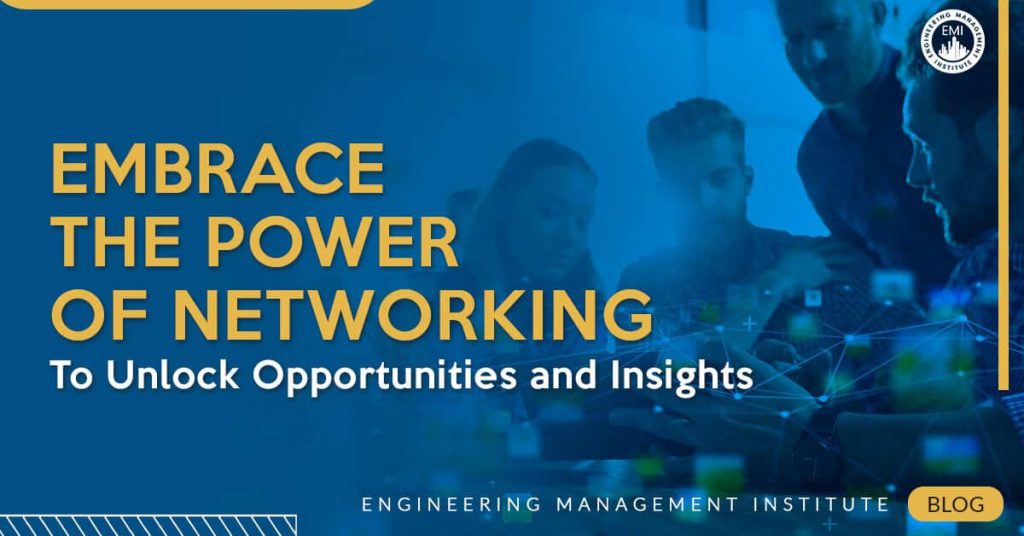This is a guest post by Jeff Perry, MBA

“Networking is not about just connecting people. It’s about connecting people with people, people with ideas, and people with opportunities.” ~ Michele Jennae
Networking and its validity or importance is written and talked about extensively — but what do you actually do about it?
While I am a proponent of networking both inside and outside your organization, this article will be mostly focused on networking with those you don’t work with currently. You need to look outside and learn from people who are in different companies, roles, and environments from you.

Doing so will expand your insights, understanding, and opportunities beyond what you can do if you are only creating connections inside your current organization.
Networking on the Outside
Let’s look at a few reasons why establishing your network outside of your organization can be helpful. Reasons include, but are not limited to:
- They can provide future job opportunities or volunteer projects
- They may be a source of referrals for business or hiring
- You can learn from their experiences and perspectives
- Connecting across the industry could create partnership opportunities
- You can build your confidence
- You can increase your influence in the industry at large
- It can open you up to opportunities to speak or share thought leadership with others
What benefits and opportunities would you add to this list?
What reasons are most important to you now, and which do you feel would be most influential to you later in your career?
When you consider this, it might help you make networking a bigger priority instead of just neglecting it.
Networking Fundamentals
“The time to build a network is always before you need one.” ~ Douglas Conant
The sad thing is many people don’t work on networking until they really NEED their network. Instead, you should be cultivating your network all the time, so that when you need it, you have built relationships with many people who can help!

But it can be hard to know where to start and how to do it effectively.
Don’t get too discouraged — just start where you already are!
Are you involved in other organizations outside of your current job? These can be faith-based, volunteer situations, hobby experiences, or any other places where people gather physically or virtually. Simply using these opportunities to engage not just in what is going on in the moment, but to try and connect with people on a personal level, can go a long way.
Ask someone why they are there, how did they find out about the event/cause, and what they most enjoy about it. You can then ask about their professional interests, which may or may not align with yours. It will likely require you to get outside of your comfort zone to start these conversations — that’s a good thing! And this is the whole point — networking is an opportunity for you to take initiative!
As a note: You may be surprised how people who are in different industries or functions can influence your opportunities. Don’t just stick to people who do similar things to you!
Once you are utilizing the situations and groups you are already a part of, you can consider other places you might want to grow your network.
This should be done intentionally by asking yourself questions like:
- What career opportunities might I consider in the future?
- Are there particular skills I need to be building right now?
- Are there topics or causes I want to engage in more deeply?
- Which companies/organizations do I want to learn more about?
Asking yourself these questions will direct you to organizations, people, causes, and opportunities that you can connect with and meet those who can help you progress in the areas you identify.
Sometimes you’ll be connecting in groups, sometimes you might target an individual. Either way, if you connect with someone you want to grow a deeper connection to, find some way to take the relationship beyond the first interaction. Set up another meeting, make some plans, or at minimum collect their contact information so you can follow up.
Be a Giver, Not a Taker
“Networking that matters is helping people achieve their goals” ~ Seth Godin
This point is critical. All too often we tend to talk about networking only in terms of what we can GET out of it.
But that is not a strong foundation for building meaningful relationships (which, by the way, is what networking is about).
So here’s the principle: Don’t just use people or be a “taker” in relationships. Be a giver. Find a way to be a positive contributor.
Ways you can contribute to relationships include:
- Being extremely gracious as they share insights and resources
- Volunteering time and resources you have to causes they care about
- Following up to show that you care and value what they have given to you
- Connecting them with anyone you know who can be helpful
- Going above and beyond to contribute to the relationship in a way that is meaningful to them (which means you need to ask and find out)
Any other ideas you have to be a giver? Share them in the comments!
Take Some Action!
Networking can be life-changing. Take one small action this week to expand or strengthen your network.
Reach out to someone new, reconnect with an old contact, or join a new group you want to be a part of.
Just do something! You won’t regret it!
Accelerate Your Career — Free Resource!
We didn’t talk much about this, but one of the great things external networks can do is open you up to new mentors. So if that’s what you’re looking for, I’ve got a free resource: 48 Amazing Questions to Ask Your Mentor!
Grab it free today at https://www.engineeringcareeraccelerator.com/mentor-questions.
About Jeff Perry, MBA
Jeff Perry is a leadership/career coach for engineers, building mindsets, leadership, and career intentions to unlock hidden potential and remove self-imposed roadblocks for career and life. For years, he has had the pleasure of supporting engineers and software pros, from new grads to director level. Having been on the front lines in the technical world, he has been able to map out the necessary skills for becoming a quality leader in the field.

You can connect with Jeff on LinkedIn at https://www.linkedin.com/in/jeffcperry/ or visit his website, https://morethan-engineering.com. Jeff also has a new, FREE, on-demand training course for engineers who are job searching or in job transitions. You can see it at https://engineeringcareeraccelerator.com.
New To Technical Leadership?
The transition from individual contributor to technical leader is a difficult one. Jeff put together a FREE, 90-day guide for those moving through this transition to help them be as successful as possible. You can get it here: https://morethan-engineering.com/career-clarity
Please leave your comments, feedback or questions in the section below on embracing the power of networking to unlock opportunities and insights.
- If you enjoyed this post, please consider downloading our free list of 33 Productivity Routines of Top Engineering Executives. Click the button below to download.Download the Productivity Routines
To your success,
Anthony Fasano, PE, LEED AP
Engineering Management Institute
Author of Engineer Your Own Success

